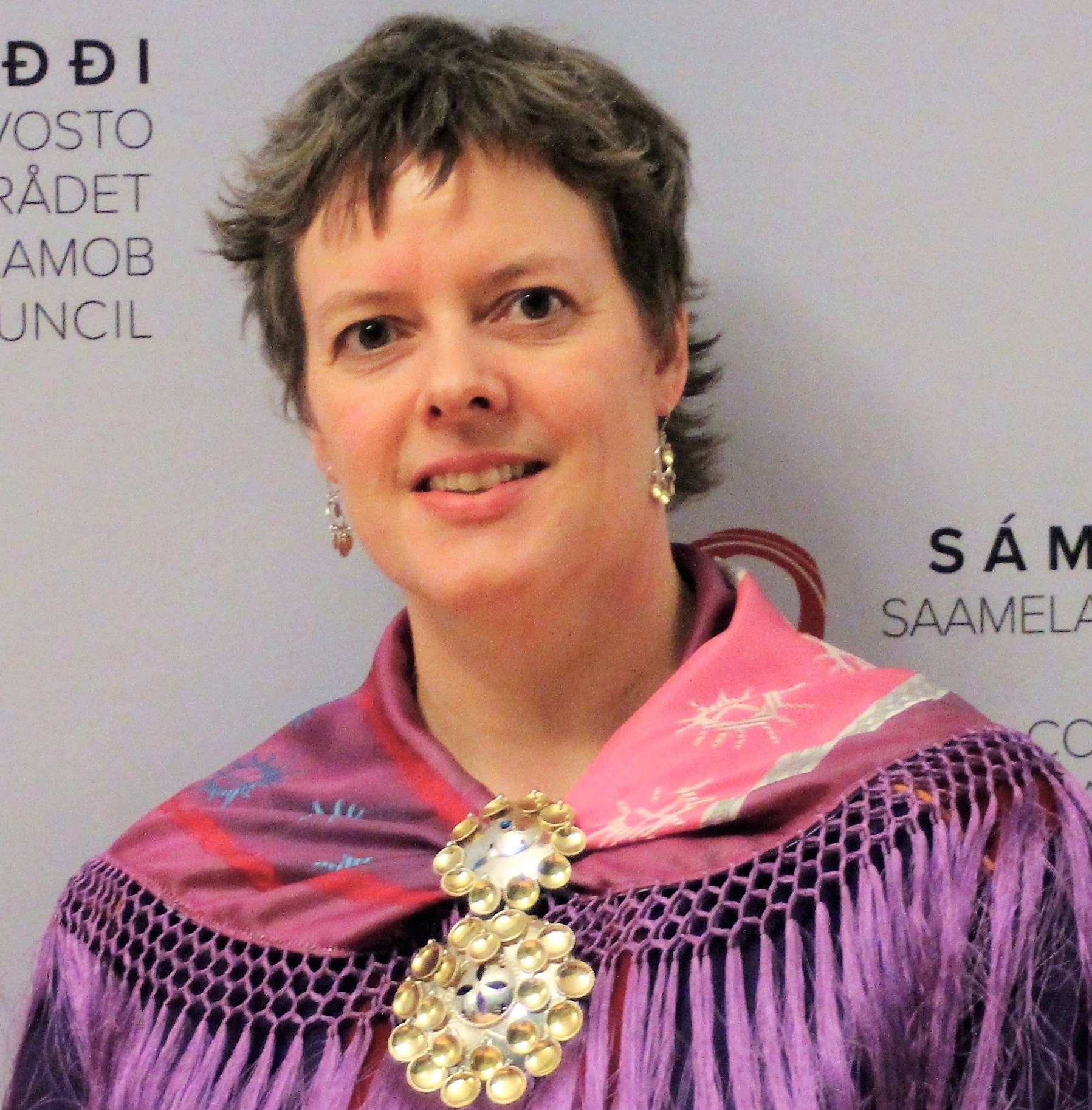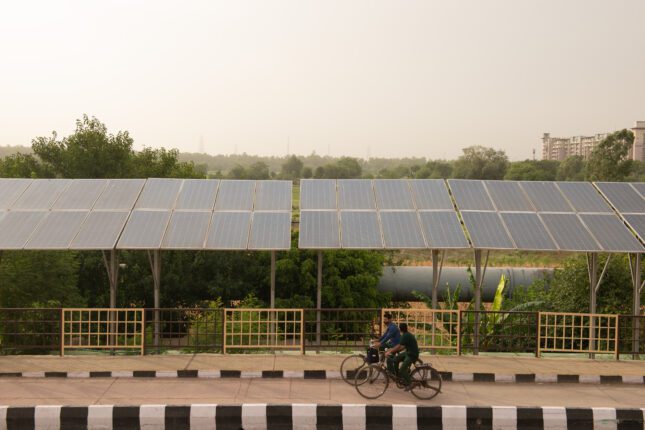-
The Arc | Climate Justice in the Arctic: Part 2
› In today’s episode of The Arc, ECSP’s Claire Doyle and Angus Soderberg interview Dr. Benno Fladvad, Junior Professor for Natural Science Peace Research with a focus on Climate and Security at the University of Hamburg. Dr. Fladvad unpacks the potential environmental justice issues that arise as renewable energy deployment across the globe accelerates. Additionally, he also describes the challenges of balancing the demand for rapid decarbonization with equity and justice considerations, drawing on examples from the Saami communities’ experience with green hydrogen and wind development. We also glean Dr. Fladvad’s insights into how energy projects can move beyond ineffective consultation processes toward peacebuilding and justice for marginalized communities. Select quotes from the interview are featured below.
In today’s episode of The Arc, ECSP’s Claire Doyle and Angus Soderberg interview Dr. Benno Fladvad, Junior Professor for Natural Science Peace Research with a focus on Climate and Security at the University of Hamburg. Dr. Fladvad unpacks the potential environmental justice issues that arise as renewable energy deployment across the globe accelerates. Additionally, he also describes the challenges of balancing the demand for rapid decarbonization with equity and justice considerations, drawing on examples from the Saami communities’ experience with green hydrogen and wind development. We also glean Dr. Fladvad’s insights into how energy projects can move beyond ineffective consultation processes toward peacebuilding and justice for marginalized communities. Select quotes from the interview are featured below. -
ECSP Weekly Watch | September 3 – 6
›
A window into what we’re reading at the Wilson Center’s Environmental Change and Security Program
Proliferation of Icebreakers in the Arctic (Foreign Policy)
As climate change-induced melting of ice sheets clears new pathways, the fast-melting Arctic now has a new strategic race: icebreakers. Russia covers over half of what is defined as “Arctic” territory, and it has the largest number of icebreakers in the region. Russia’s attempt to consolidate and expand has led the US and its NATO allies to redefine their own Arctic security strategy.
-
Climate Security in South Sudan: A Conversation with Ratia Tekenet
› In today’s episode of New Security Broadcast, ECSP Director Lauren Risi interviews Ratia Tekenet, a Climate Security Expert with the UN Mission in South Sudan (UNMISS) and a former ECSP staff member. In their conversation, Ratia explores how climate change is intensifying South Sudan’s security challenges, creating an immense humanitarian crisis. She also discusses the efforts of UN agencies, the South Sudanese government, and local communities to build resilience and respond to ongoing climate disasters, as well as the need for greater integration of the humanitarian-development-peace (HDP) nexus. Select quotes from the interview are featured below.
In today’s episode of New Security Broadcast, ECSP Director Lauren Risi interviews Ratia Tekenet, a Climate Security Expert with the UN Mission in South Sudan (UNMISS) and a former ECSP staff member. In their conversation, Ratia explores how climate change is intensifying South Sudan’s security challenges, creating an immense humanitarian crisis. She also discusses the efforts of UN agencies, the South Sudanese government, and local communities to build resilience and respond to ongoing climate disasters, as well as the need for greater integration of the humanitarian-development-peace (HDP) nexus. Select quotes from the interview are featured below. -
ECSP Weekly Watch | August 26 – 30
› A window into what we are reading at the Wilson Center’s Environmental Change and Security Program
A window into what we are reading at the Wilson Center’s Environmental Change and Security ProgramWorld Food Program Faces Scrutiny Over Fraud in Sudan (Reuters)
As Sudan suffers an immense humanitarian crisis due to an ongoing internal conflict between the Army Forces and the paramilitary Rapid Support Forces (RSF), the U.N. World Food Program (WFP) has provided crucial aid to people displaced by the conflict. Yet its ability to continue this crucial work is now under threat because of allegations of illicit activities made against its top officials in that country. These developments have drawn the attention of humanitarian practitioners and diplomats—who also have concerns regarding WFP’s mismanagement and how it might have contributed to the failure to deliver enough aid in Sudan.
-
ECSP Weekly Watch | August 19 – 23
›
A window into what we are reading at the Wilson Center’s Environmental Change and Security Program
What’s Next for the Teesta Water Disputes? (The Hindu)
The recent political upheaval in Bangladesh which led to the resignation of Prime Minister Sheikh Hasina and the return of Nobel Peace Prize laureate Muhammed Yunus as leader of an interim government is not the only tumult in this nation. A worsening trend in weather events there has heightened Bangladesh’s exposure to climate shocks and allowed a dispute over the Teesta River to reemerge.
-
The Arc | Climate Justice in the Arctic: Part 1
› In today’s episode of The Arc, ECSP’s Claire Doyle and Angus Soderberg interview Gunn-Britt Retter, Head of the Arctic and Environmental Unit at the Saami Council, in part one of three episodes focused on climate justice in the Arctic. We dive into Gunn-Britt’s background and her work on the Saami Council. Gunn-Britt outlines how climate change is impacting the livelihoods and daily lives of the Saami people and how even our responses to climate change can threaten Indigenous rights and land use. She also makes the case for a fundamental reexamination of our relationship with nature to make progress on addressing climate change. Select quotes from the interview are featured below.
In today’s episode of The Arc, ECSP’s Claire Doyle and Angus Soderberg interview Gunn-Britt Retter, Head of the Arctic and Environmental Unit at the Saami Council, in part one of three episodes focused on climate justice in the Arctic. We dive into Gunn-Britt’s background and her work on the Saami Council. Gunn-Britt outlines how climate change is impacting the livelihoods and daily lives of the Saami people and how even our responses to climate change can threaten Indigenous rights and land use. She also makes the case for a fundamental reexamination of our relationship with nature to make progress on addressing climate change. Select quotes from the interview are featured below. -
ECSP Weekly Watch | August 12 – 16
›
A window into what we are reading at the Wilson Center’s Environmental Change and Security Program
Mpox Outbreak a Global Health Emergency, Again (The Washington Post)
Various rapidly spreading mpox strains in Central and East African countries have led the World Health Organization (WHO) to declare the viral infection as a global health emergency. More than 15,000 people have been infected this year alone, with over 500 deaths reported. Mpox is transmitted largely through exposure to infected animals, as well as via skin-to-skin or sexual contact, and it disproportionately affects heterosexuals and sex workers.
-
Accelerating the Transition: Can the U.S. Support India’s Path to Net Zero?
›
Energy is a bridge that has historically fostered the U.S.-India relationship. The reasons are many. Both economies focus on energy security, climate action, economic cooperation, and technological innovation.
Recent innovations in India offer new challenges and opportunities. The country has rapidly deployed renewable energy (RE) technologies to meet its stated Net Zero targets. This effort has exceeded its promises; 40% of India’s electricity now comes from renewable sources. And the nation’s other ambitious target— installing 450 GW—would triple this existing capacity in less than ten years.
Showing posts from category climate change.



 In today’s episode of New Security Broadcast, ECSP Director Lauren Risi interviews Ratia Tekenet, a Climate Security Expert with the UN Mission in South Sudan (UNMISS) and a former ECSP staff member. In their conversation, Ratia explores how climate change is intensifying South Sudan’s security challenges, creating an immense humanitarian crisis. She also discusses the efforts of UN agencies, the South Sudanese government, and local communities to build resilience and respond to ongoing climate disasters, as well as the need for greater integration of the humanitarian-development-peace (HDP) nexus. Select quotes from the interview are featured below.
In today’s episode of New Security Broadcast, ECSP Director Lauren Risi interviews Ratia Tekenet, a Climate Security Expert with the UN Mission in South Sudan (UNMISS) and a former ECSP staff member. In their conversation, Ratia explores how climate change is intensifying South Sudan’s security challenges, creating an immense humanitarian crisis. She also discusses the efforts of UN agencies, the South Sudanese government, and local communities to build resilience and respond to ongoing climate disasters, as well as the need for greater integration of the humanitarian-development-peace (HDP) nexus. Select quotes from the interview are featured below.
 In today’s episode of
In today’s episode of 


